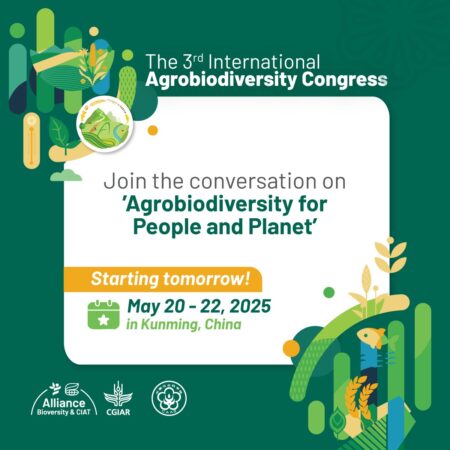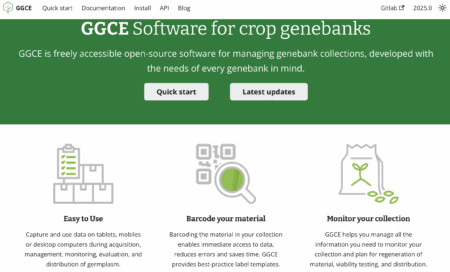- Times of India says “India needs a new doomsday seed vault.” Why not just use the one already there in Svalbard?
- Meanwhile, women in the Sundarban are doing it for themselves.
- Maybe it’s community doomsday seed vaults that India needs?
- Fiji’s cassava is facing a doomsday of its own.
- Georgia — the country — is working on a documentary on crop diversity which will no doubt include their seed deposit in Svalbard.
- Kenya has a pretty good community genebanks video of its own.
- Nigeria is all over crop diversity. Not just once, but twice.
- Coffee prices going up? Can you imagine what will happen if we don’t conserve enough of its diversity?
- Want more examples of the coolness of crop diversity and its guardians? Slow Food has your back.
- La Via Campesina needs to encouragement either, where “peasant seeds” and their guardians are concerned.
- Even the World Economic Forum wants in on the act.
- And yet the seed sector seems…reluctant?
- Good job Genesys is getting faster, eh?
3rd International Agrobiodiversity Congress winds down
I occurs to me that I haven’t mentioned the Third International Agrobiodiversity Congress much since it was originally announced. Sorry about that. Anyway, it’s all over now, and it seems to have been very well attended and reasonably productive. There was supposed to be a “manifesto” coming out but I see no sign of it online yet. I’ll keep you posted. But if you were there, do tell us all who couldn’t be there how it went.
Learn how to manage your genebank data with the experts
If you run a genebank and are struggling to manage your data, you might want to consider a piece of nifty software called GRIN-Global Community Edition. And not least because there are some great opportunities for training, helpfully collated here by the CGIAR genebanks.
Brainfood: Complementarity, Temporality, Communality, Fonio trifecta, Atriplex domestication, Egyptian clover in India, Genebank information systems
- A significantly enhanced role for plant genetic resource centres in linking in situ and ex situ conservation to aid user germplasm access. On-farm conservation must result in use of the conserved diversity, and genebanks can help with that. Just another way of saying the two approaches are complementary?
- Looking back to look ahead: the temporal dimension of conservation seed bank collections. Those genebanks may need to do repeated sampling of the same population though.
- Landrace diversity and heritage of the indigenous millet crop fonio (Digitaria exilis): Socio-cultural and climatic drivers of change in the Fouta Djallon region of Guinea. Repeated sampling would defintely have helped.
- Community seedbanks in Europe: their role between ex situ and on-farm conservation. Repeated sampling is kind of what community seedbanks do, no?
- Impacts of climate change on fonio millet: seed germination and suitability modelling of an important indigenous West African crop. Community seedbanks may not be enough though.
- Phylogenetics, evolution and biogeography of four Digitaria food crop lineages across West Africa, India, and Europe. Maybe the wild relatives will help.
- Black Ash – a Forgotten Domestication Trait in Garden Orach (Atriplex hortensis L.). It’s amazing what people domesticated plants for in the past. And might in the future.
- Quality seed production scenario of Egyptian clover (Trifolium alexandrinum) in India: A 24-year retrospective analysis. But in the end, you have to get high quality certified seeds out, and that’s not always easy.
- The potential of seedbank digital information in plant conservation. Will definitely need a pretty good documentation system to keep all the above straight.
Nibbles: Nourishing investments, Genebank RoI, Seed science double, Ecuador genebank, Ethiopian genebank, MSSRF genebank, CG genebanks, Botanic gardens, SwissAid saves seeds, Brazil conservation, Indian diner, Kenyan food, Saladino on citrus, Lost apple, Seed Savers, Hybrids, Germplasm crime
- All of IFAD’s 5 investments that will help nourish the world need crop diversity. Prove me wrong.
- And yet we still have to have articles on communicating the importance of genebanks.
- Cosmos tries to do it by pointing to the science.
- Smithsonian Magazine tries to do it by saying it’s tricky.
- Genebanks try to do it by having nice new websites and talking to the media. Some of the biggest media.
- CGIAR tries to do it by calling them an Accelerator.
- IIED tries to do it by saying even botanic gardens can help farmers.
- SwissAid thinks “[n]ational and international gene banks should give farmers’ organizations low-threshold access to their collections.” No argument there.
- Maybe we should have songs about genebanks, like the Maxakali have about the Atlantic Forest.
- Or we could just talk about food, food, glorious food.
- Could also just fall back on the good old canonical lost-heirloom-apple-found story.
- Or the canonical medical case for “ancient grains” story.
- Though even there the heirlooms vs hybrids debate will rage I suppose…
- But, whatever we do, let’s not take it to extremes, shall we?

